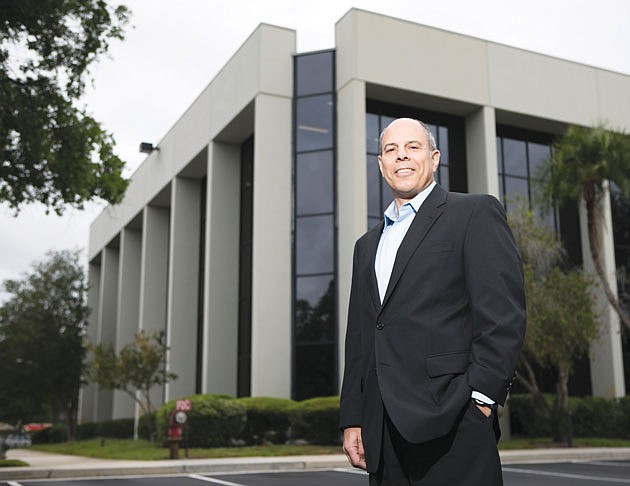- November 25, 2024
-
-
Loading

Loading

The Feil Organization took a bit of a gamble in 2011 when it bought the 15-building Baypoint Commerce Center.
The largely 1970s-era St. Petersburg office park looked run down from a lack of maintenance, recession-crippled tenants were leaving the park in droves, and a nationwide trend toward re-urbanization was breathing new life into Gulf Coast downtowns.
Six years and roughly $20 million in improvements later, though, Baypoint is toasting new tenants and higher occupancy. Most recently, accounting firm Spoor Bunch Franz announced late last month plans to consolidate offices from downtown St. Petersburg and Clearwater and move its headquarters to Baypoint.
With Spoor Bunch's 17,950-square-foot deal, Baypoint's overall occupancy now stands at 85% — up from 60% when New York-based Feil bought the 76-acre business park.
At the Glades Building, which Spoor Bunch will occupy by the end of the year, occupancy is now 91%.
“Once people saw the commitment Feil was making to the park, they understood, and that changed the ideas about Baypoint,” says Barry Hanerfeld, the Cushman & Wakefield senior director who represents the park for Feil.
“Every building was touched, and in some cases completely redone. And that's because Feil has a very long-term ownership mentality, which is unusual for the Tampa area, where most buildings have historically transacted every three to seven years.”
As part of its renovations, Feil installed new landscaping and LED lighting, refurbished lobbies, upgraded parking, improved signage and added new sidewalks, benches and patios throughout the 700,000-square-foot park.
Hanerfeld also touted the abundance of free, surface parking at Baypoint, which was developed beginning in 1971 just north of downtown St. Petersburg.
“Parking has become a challenge in downtown Tampa and St. Petersburg,” Hanerfeld says. “There's a real scarcity of it in some cases.”
Unlike urban office buildings, which typically contain two or three parking spaces per thousand square feet of rented office space, Baypoint offers five spaces per 1,000 square feet, he says.
As Gulf Coast office markets have tightened amid an improving economy and new supply has been scant — or in some cases, nonexistent — companies have turned to suburban parks like Baypoint that may have been ignored in a rush to city centers.
At least one key commercial real estate analyst contends the lack of new supply, coupled with returns that are slated to exceed those of asset classes like hospitality, multifamily and retail over the next three years will renew interest in suburban parks like Baypoint.
“Suburban office is poised to be the next asset class to experience significant recovery, because it's been underused and under loved for the past three, five, seven years,” say Spencer Levy, head of research for the Americas for commercial brokerage firm CBRE Inc.
Along the Gulf Coast, there are already signs that such a recovery is taking hold.
New Jersey-based Vision Properties, which acquired the 71-acre Renaissance Center in Tampa's Westshore District in early 2016 for $108 million, decided late last year to push ahead with a speculative office building — the first major new suburban project in years in the Tampa.
Even more remarkable, Vision announced earlier this month that Auto Club Group planned to lease the entire 150,000-square-foot building for its Florida regional headquarters.
Vision expects to complete the Renaissance VI building, which will bring the park to 723,000 square feet, in April 2018. Renaissance's other buildings are fully occupied by Capital One, which developed the park, and WellCare.
“We looked around the market, and in terms of large, contiguous blocks of space, the more we looked the fewer and fewer we found in downtown Tampa or Westshore,” says Will Bertolero, Vision's executive vice president of asset management, who is overseeing Renaissance VI's development.
“So we decided it kinda made sense to move ahead on a speculative basis, because there was not a lot of competition for 25,000-square-foot blocks of space and above,” he adds.
Bertolero notes, too, that while Renaissance Center features abundant amenities — including its own food court, a 20,000-square-foot fitness center complete with basketball and racquetball courts — what also attracted AAA was the park's 3,200 structured parking spaces.
Feil hopes to take advantage of the parking trend, as well, at Baypoint, its only Florida asset in a portfolio that totals 26 million square feet of commercial space in New York, Louisiana, Virginia, Washington, D.C., Illinois and Indiana.
“Baypoint had lost a lot of tenants prior to our involvement with it, and it was looking a bit rundown,” says Brian Feil, a Feil vice president and a third-generation member of the 60-year-old, family-owned company.
“We think Baypoint is a great piece of real estate, and we spent a great deal of time, effort and energy getting it up to our standards,” he adds.
W.G. Spoor, a Spoor Bunch Franz partner, says Feil did “a great job sprucing the park up.”
“The location was perfect for us, because we have clients in Tampa, St. Petersburg and Clearwater,” Spoor says. “So Baypoint was very central, and it met our size requirements.”
Spoor expects his firm to move into Baypoint's Glades Building, a 71,400-square-foot building at 877 Executive Center Drive W., by the end of this year.
Hanerfeld says Feil is also actively working to attract larger tenants to Baypoint, a departure from previous ownership. Spoor Bunch Franz meets that criteria, as do tenants such as Clear Channel Communications, Informed Medical, ValPac, Jabil Circuit, and others.
“Their objective is to provide space for larger tenants than has been historically done at Baypoint,” Hanerfeld says. “It had been home more to mom-and-pop firms, but Feil has really stressed the desire to go after the larger companies that are out looking in the marketplace.”